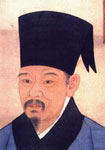“商丘冷坐君知否”的意思及全诗出处和翻译赏析
“商丘冷坐君知否”全诗
君家有酒能无事,客醉连宵遣不回。
诗就滴消盘上蜡,信来飘尽岭头梅。
商丘冷坐君知否,瓶罄应须有耻罍。
分类:
作者简介(苏辙)

苏辙(1039—1112年),字子由,汉族,眉州眉山(今属四川)人。嘉祐二年(1057)与其兄苏轼同登进士科。神宗朝,为制置三司条例司属官。因反对王安石变法,出为河南推官。哲宗时,召为秘书省校书郎。元祐元年为右司谏,历官御史中丞、尚书右丞、门下侍郎因事忤哲宗及元丰诸臣,出知汝州,贬筠州、再谪雷州安置,移循州。徽宗立,徙永州、岳州复太中大夫,又降居许州,致仕。自号颍滨遗老。卒,谥文定。唐宋八大家之一,与父洵、兄轼齐名,合称三苏。
《次韵王巩见寄》苏辙 翻译、赏析和诗意
《次韵王巩见寄》是苏辙在宋代创作的一首诗词。以下是它的中文译文、诗意和赏析:
池上轻冰暖却开,
迎春送腊仰衔杯。
君家有酒能无事,
客醉连宵遣不回。
诗就滴消盘上蜡,
信来飘尽岭头梅。
商丘冷坐君知否,
瓶罄应须有耻罍。
中文译文:
池塘上的轻薄冰已经融化,春天来临迎接冬季的离去,我仰起杯中的酒,与朋友共庆。你家里有酒,可以无忧无虑,而我却被醉客连夜留住,无法返回。
诗句如同滴落在盘上的蜡烛一样消逝,来信也随风飘向岭头的梅花。在商丘冷落地坐着,你是否知道,空瓶已空,应该感到羞愧。
诗意和赏析:
这首诗词描绘了一个春日的场景,表达了作者对友谊和人生的思考。首句“池上轻冰暖却开”,展示了冬季的消逝和春天的到来,寓意着时光的流转和万物的复苏。通过“迎春送腊”,作者以酒为载体,表达了与朋友共庆春天到来的欢乐和豪情。其中,“仰衔杯”一句表达了欢庆之情和豪放的态度。
接下来的两句“君家有酒能无事,客醉连宵遣不回”,揭示了作者身处醉酒之中,无法离开的尴尬境地。这里的“君家”指的是朋友的家,暗示朋友有足够的酒可以尽情畅饮,而作者则因醉客的陪伴而不能离去,呈现出一种无法自拔的状态。通过这种对比,诗人抒发了对自身处境的无奈和对友谊的珍惜。
接下来的两句“诗就滴消盘上蜡,信来飘尽岭头梅”,表达了诗词和来信的短暂和消逝。诗词如同滴落在盘子上的蜡烛一样,随着时间的推移而消逝。来信也像梅花一样,随风飘散,暗示着信息的短暂和流逝。这里通过描写诗词和来信的情景,表达了作者对时光流逝和信息消逝的感慨。
最后两句“商丘冷坐君知否,瓶罄应须有耻罍”,表达了作者孤独的心境和对友谊的期待。作者孤独地坐在商丘冷落的地方,表达了内心的寂寞和无助。以“瓶罄”指代空瓶,暗示了酒已经喝完,应该感到羞愧。这里呼应了前文的“君家有酒能无事”,通过对比,表达了作者对友谊的渴望和对自身处境的反思《次韵王巩见寄》 is a poem written by Su Zhe during the Song Dynasty. Here is the Chinese translation, meaning, and appreciation of the poem:
池上轻冰暖却开,
迎春送腊仰衔杯。
君家有酒能无事,
客醉连宵遣不回。
诗就滴消盘上蜡,
信来飘尽岭头梅。
商丘冷坐君知否,
瓶罄应须有耻罍。
Translation:
The thin ice on the pond melts as warmth emerges,
Welcoming the arrival of spring and bidding farewell to winter, I raise my cup high.
At your home, with abundant wine, worry is unnecessary,
Yet intoxicated guests detain me throughout the night, preventing my return.
Poetry drips like wax on a plate, fading away,
A letter arrives, drifting away with the plum blossoms on the mountain.
Sitting alone in the cold of Shangqiu, do you know?
An empty bottle should bring shame and reflection.
Meaning and Appreciation:
This poem depicts a scene of spring and reflects the author's contemplation on friendship and life. The opening line, "The thin ice on the pond melts as warmth emerges," portrays the passage of winter and the arrival of spring, symbolizing the flow of time and the revival of all things. Through the phrase "welcoming the arrival of spring and bidding farewell to winter," the author celebrates the joy and exuberance of welcoming spring together with friends, using wine as a medium. The phrase "raising my cup high" expresses the festive atmosphere and a carefree attitude.
The following two lines, "At your home, with abundant wine, worry is unnecessary, Yet intoxicated guests detain me throughout the night, preventing my return," reveal the author's predicament of being unable to leave due to the company of intoxicated guests. "Your home" refers to the friend's house, implying that the friend has plenty of wine to enjoy without worries, while the author is trapped in a situation where he cannot leave due to the presence of intoxicated guests. This conveys a sense of helplessness and an appreciation for friendship.
The subsequent lines, "Poetry drips like wax on a plate, fading away, A letter arrives, drifting away with the plum blossoms on the mountain," express the fleeting nature and transience of poetry and letters. The poet likens poetry to a candle dripping on a plate, gradually disappearing with time. Similarly, the arrival of a letter is compared to the drifting plum blossoms, suggesting the ephemeral nature of information. By describing the scenes of poetry and letters, the author conveys a sense of contemplation on the passage of time and the disappearance of messages.
The final two lines, "Sitting alone in the cold of Shangqiu, do you know? An empty bottle should bring shame and reflection," express the author's sense of solitude and longing for friendship. The author sits alone in the desolation of Shangqiu, conveying a feeling of loneliness and helplessness. The phrase "empty bottle" symbolizes the wine being consumed, implying that one should feel ashamed when the bottle is empty. By contrasting it with the earlier line, "At your home, with abundant wine, worry is unnecessary," the author expresses a yearning for friendship and reflects upon their own situation.
“商丘冷坐君知否”全诗拼音读音对照参考
cì yùn wáng gǒng jiàn jì
次韵王巩见寄
chí shàng qīng bīng nuǎn què kāi, yíng chūn sòng là yǎng xián bēi.
池上轻冰暖却开,迎春送腊仰衔杯。
jūn jiā yǒu jiǔ néng wú shì, kè zuì lián xiāo qiǎn bù huí.
君家有酒能无事,客醉连宵遣不回。
shī jiù dī xiāo pán shàng là, xìn lái piāo jǐn lǐng tóu méi.
诗就滴消盘上蜡,信来飘尽岭头梅。
shāng qiū lěng zuò jūn zhī fǒu, píng qìng yīng xū yǒu chǐ léi.
商丘冷坐君知否,瓶罄应须有耻罍。
“商丘冷坐君知否”平仄韵脚
平仄:平平仄仄平平仄
韵脚:(仄韵) 上声四纸 (仄韵) 上声七麌 (仄韵) 上声二十五有 * 平仄拼音来自网络,仅供参考;诗句韵脚有多个的时候,对比全诗即可判断。